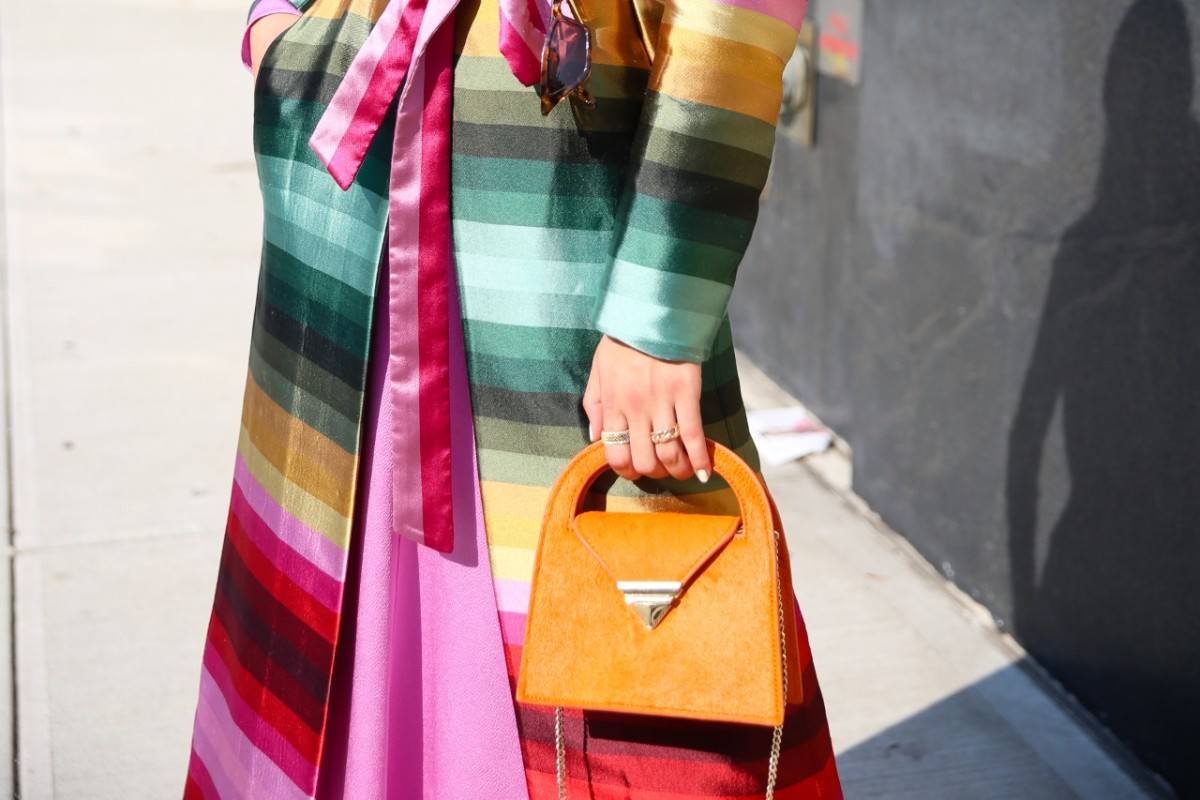So no doubt I was intrigued when one day, while scrolling through my Instagram feed, I came across a post from one of the many quirkily-dressed ex-bloggers I follow, offering sessions of something she called "fashion therapy."
"I would like more people to start thinking of personal style as self-care," says Stella Rose Saint Clair, an NYC-based artist, fashion designer and influencer, who is dressed in a jaunty hat and a lime-green 1960s two-piece skirt suit for our 15-minute consultation session via a choppy Skype connection. Saint Clair, whose style is best described as retro glamour with a dash of Pebbles Flintstone, decided to start offering "fashion therapy" sessions after years of her outfits receiving enthusiastic compliments from strangers, followed up by the common refrain, "I could never pull that off."
"If you like fashion but are not having fun with it, what are you doing with your life?" she deadpans.
"Fashion therapy" purports to offer something that, though not coming from a trained mental health professional, parallels real therapy in at least one way. It's meant to be a safe space in which one can spill their ugliest thoughts and feelings and work through them to find healthy emotional coping mechanisms.
The name "fashion therapy" was a fluke. Saint Clair did test consultations with two clients that began as garden variety wardrobe consults but ended up going to a place that was far deeper and more interesting. "I think [the client] said something like, 'This is like fashion therapy.' Then I realized that's what it should be called."
As a teen, Saint Clair dressed to blend in, in combat boots and hoodies. But at 16, she decided to "embrace the unusual," after realizing that the bullying she was subject to had little to do with the way she looked. She put on an outfit consisting of fairy wings, glitter makeup and a lingerie slip and headed out to Seattle's Pride parade, feeling confident in her looks for the first time. Soon enough, she found people began treating her differently and her newfound confidence kept her from retreating into the background of her own life. "Fashion was kind of my therapy, so I'm approaching it from that angle," she says.
The conception that fashion has the power to transform a person's outlook is not new – in fact, it is an entire academic field pioneered by the Columbia University-educated professor Dawnn Karen, who currently teaches at FIT. Fashion psychology is "the study and treatment of color, beauty, style, image and shape and its effect on human behavior while addressing cultural sensitivities and cultural norms."

Karen is a trained therapist whose main focus is styling from the inside out. "Clothing can be used as a therapeutic modality," she says. "Just like a psychiatrist would give a patient a prescription for depression, I can prescribe someone colors to wear." Karen's goal is to counsel her clients and create a positive alignment between the way they look and the way they feel.
The main difference between Saint Clair's "fashion therapy" and the broader field of fashion psychology — aside from credentials — is that the approaches begin from opposite ends of the spectrum. Karen's fashion psychology begins with discussing day-to-day problems and using the information gleaned to dissect how it may be affecting a patient's approach to clothing. As Karen says, "We actually do therapy, there's just a fashion component." Meanwhile, Saint Clair's approach begins with discussing personal style then determining which life circumstances may be functioning as roadblocks.
When I initially contacted Saint Clair about participating in fashion therapy, I wasn't so sure I had any issues to work out. I had finally nabbed my dream job as an editor in fashion, and style-wise, I'd refined my aesthetic over the course of my twenties down to a science (two words: gothic grandma). Still, I tried to enter the process with an open mind. In our 15-minute Skype consultation session, I identified feelings of self-consciousness and inferiority that stemmed from having to spend my professional life around impeccably groomed people, as well as a weird compulsion to change whatever shoes I'm wearing from a pair that completed the outfit to a crappy, beat-up pair every time I leave the house.
The next day, via Skype, Saint Clair came back to me offering her own interpretation of my issues: "I believe your low-self esteem comes from assuming that those who look more put together are potentially getting better opportunities than you. That's sometimes true, but it takes away your own value and you forget to remember what is special about you." She also suggested that my feelings of inferiority and habit of wearing beat-up shoes were related, rather than two separate issues. "By dressing down, you are subconsciously telling yourself that your day isn't good enough to dress up for and undervaluing your day-to-day worth." Saint Clair offered up concrete suggestions on how I might adopt healthier habits and prescribed me to wear my jazziest outfits for a week and see how I felt.
The next week, I planned out all of my outfits in advance and made a point of sticking to the script rather than making any last-minute improvisations. I did my makeup, carefully applied lipstick and generally made an effort. The longer I followed Saint Clair's advice, the more I realized she had completely nailed it. I may never be a person with perfectly coiffed tendrils of hair or a preternatural elegance that draws people into my orbit, but I did begin to accept that some of the clothing-related habits I foist upon myself are a minor form of self-sabotage. In the grand scheme of life, this is a small and perhaps ineffectual revelation, but a revelation nonetheless — and one I would never have come to on my own without the help of fashion therapy.

No comments:
Post a Comment